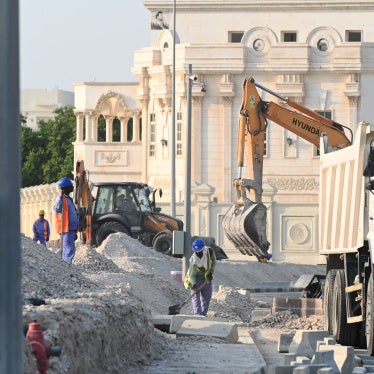(Dubai) - The United Arab Emirates should stop harassing human rights defenders and stifling dissent, Human Rights Watch said today in releasing its World Report 2011 chapter on the UAE.
The 649-page report, the organization's 21st annual review of human rights practices around the globe, summarizes major human rights issues in more than 90 countries worldwide. Throughout 2010, UAE authorities censored and harassed human rights defenders and lawyers, impeding independent reporting that could help curb abuses. At the same time, Human Rights Watch said, the announcement on January 15, 2011, of new labor regulations to curb exploitative recruiting agents who entrap foreign workers with recruiting fees and false contracts signals an extremely positive commitment to address one of the country's most glaring human rights problems - the abuse of migrant construction workers.
"The actions by UAE authorities against its human rights advocates are completely inconsistent with the government's message that this is an open and tolerant country," said Sarah Leah Whitson, Middle East director at Human Rights Watch. "The UAE government should recognize that Emiratis who promote peaceful political debate are as important for the country's development and progress as its bankers and builders."
Over the past year, UAE authorities imposed mounting restrictions on the Jurist Association, a nongovernmental organization established in 1980 to promote the rule of law and raise professional standards. The government did not permit association representatives to attend meetings abroad and cancelled symposiums in the UAE that it deemed controversial. Members also complained of official pressure to quit the association.
Despite these pressures, Emirati citizens insisted on their right to speak out. The former association president Muhammad al-Mansoori, whom authorities have harassed for years, was dismissed from his position as a legal adviser to the government of Ras Al Khaimah in January 2010 after he gave a television interview in which he criticized restrictions on freedom of speech in the country. Authorities have subjected him to a travel ban since October 2007 and have refused to renew his passport since March 2008. He is unable to visit two of his young children living abroad. Another son in the UAE has been unable to obtain the necessary security clearance to get a job because of his father, al-Mansoori said.
"My family has suffered a lot over the years because I am outspoken in my belief that the government should respect human rights," al-Mansoori told Human Rights Watch in January 2011. "My young kids [abroad] are always asking me, ‘Daddy why can't you come,' and I don't have an answer for them."
Over the summer, UAE police arrested at least four young activists after they attempted, on July 15, to organize a peaceful protest about increasing oil prices. Authorities fired one of the organizers from his government job, and Dubai police detained him for a week for "inciting the nation against the government," even though the protest was cancelled. Another was imprisoned for more than a month and suspended from his job.
Beginning in November, the UAE government stepped up efforts to quell online dissent. First, authorities blocked access to localnewsuae.com, a news portal that features wide-ranging articles and blog posts on local and international issues. In January, authorities added the online discussion forum UAE Hewar to its list of prohibited websites and blocked access to the site's facebook and twitter pages. The popular website encouraged debate on topics ranging from freedom of expression to political rights.
"The UAE should take a long, hard look at what happens to governments that suppress the rights of its citizens to speak out or that think they can control the information people share," Whitson said. "Tunisians are not the only ones in the Arab world who will insist that no government has the right to trample their rights."
While the situation for migrant workers in the UAE remained dire over the last year, the government announced positive labor reforms, most significantly the new regulations in January 2011 to ensure that workers will not pay any fees, either in the Emirates or abroad, to secure their jobs. In the event that a fee has been levied, recruitment agencies will be obligated to reimburse the worker.
The regulations will also hold recruitment agencies partly liable if the company where it places workers does not pay them and ban recruiters from placing workers with companies involved in collective labor disputes. Recruiters that outsource workers for a third party will have to put down a Dh1 million (US$270,000) deposit, and Dh2,000 (US$540) per employee, which will be available to pay workers' salaries if the company fails to do so.
In addition, in March, the Labor Ministry announced creation of a new unit to identify and investigate potential labor trafficking cases. In May, the Labor Ministry extended the summer season midday break by an extra month, to three months, for individuals working outside in sweltering heat.
Over the year, though, hundreds of laid-off migrant workers were stranded in labor camps without electricity or running water for months on end after their Dubai-based employers closed; some had to fight off rats while sleeping amid garbage heaps. Other workers told Human Rights Watch that some employers forced them to accept reduced pay and benefits or face dismissal.
In May, hundreds of workers marched from their Sharjah labor camp to the Labor Ministry in Dubai demanding back pay and to be sent home. The workers said that they were living in squalor and that their employer had not paid them in six months. The Ministry liquidated the company's assets to pay the workers and buy their flight tickets. However, many went home with just a portion of their wages, while others received nothing at all.
Female domestic workers in the UAE interviewed by Human Rights Watch in 2010 reported that they suffered unpaid wages, food deprivation, long working hours, forced confinement, and physical and sexual abuse. Notwithstanding its recent legal reforms, the government has not done enough to regularize the rights of migrant domestic workers.
Labor reforms still have a way to go, and abolition of the sponsorship (kafala) system is key among the needed changes, Human Rights Watch said. However, in October, two weeks after Kuwait announced plans to scrap its kafala system, the UAE's labor minister said the UAE would not follow suit.
"The UAE's new regulations on recruiting agents are a breakthrough in recognizing the harm and suffering caused to workers forced to pay recruiting fees, and the years of salary they have to spend to pay for them," Whitson said. "The UAE has many good laws on paper - the test for 2011 will be enforcing them."








